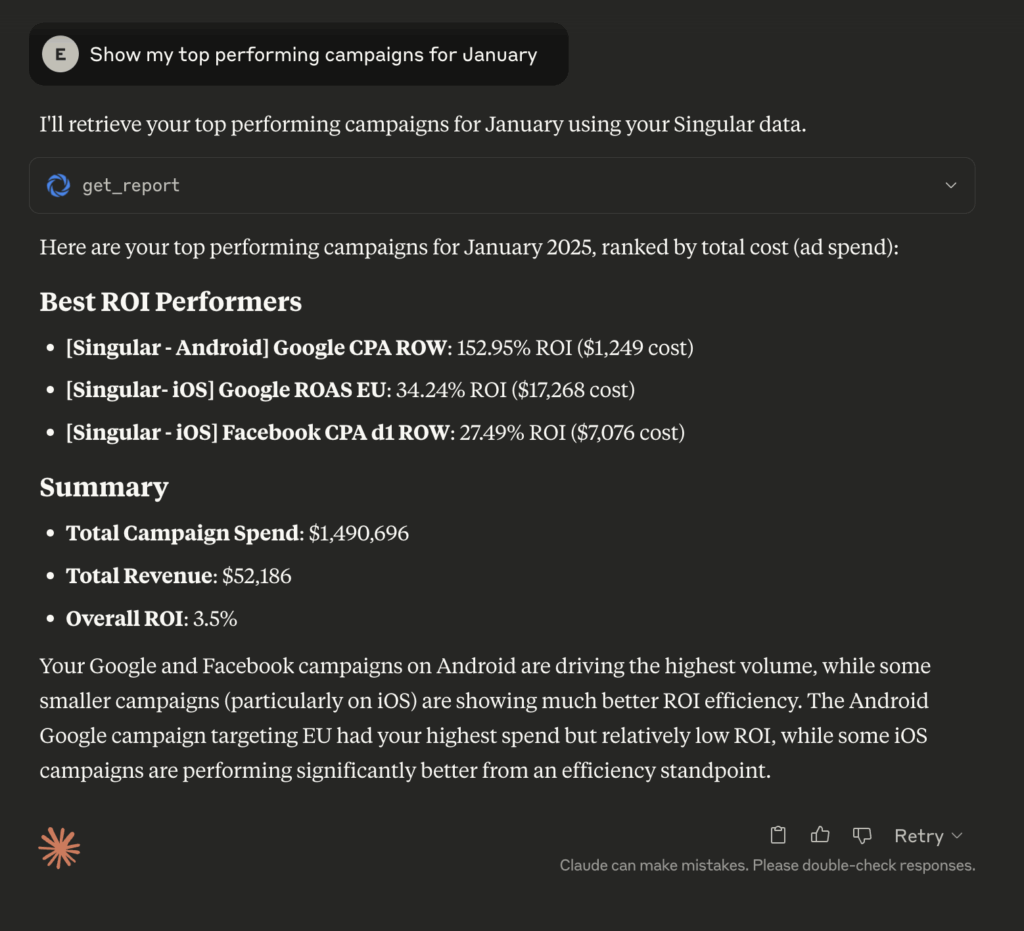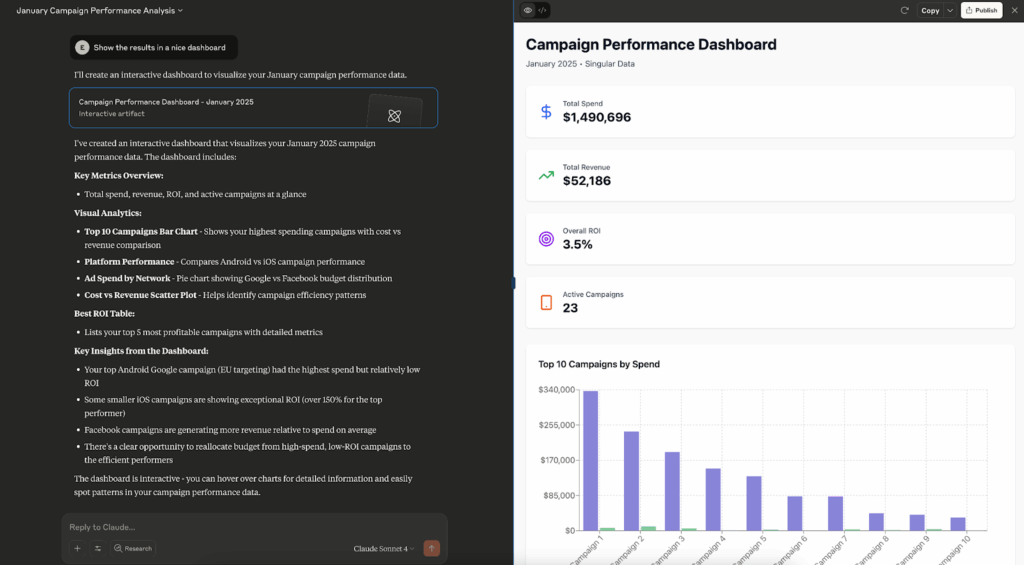Content
Stay up to date on the latest happenings in digital marketing
Summary
-
Leverage AI for In-Depth Insights: Marketers are increasingly using AI to gain deeper insights into campaign performance, with complex queries about ROI, LTV patterns, and cross-platform comparisons becoming commonplace. Emphasize the use of AI tools to analyze and visualize data, enabling more informed decision-making and strategic adjustments.
-
Focus on Performance Metrics: The common queries indicate a strong interest in specific performance metrics such as ROAS, install tracking, and revenue comparisons. Marketing professionals should prioritize these key performance indicators in their campaigns to better measure effectiveness and optimize resource allocation.
-
Embrace Natural Language Queries: Marketers are utilizing longer, more detailed queries when interacting with AI, suggesting a trend towards more conversational data analysis. Encourage teams to craft comprehensive questions that encompass multiple parameters to extract richer insights, thus maximizing the utility of AI-driven analytics.
Last month we integrated Singular data and insights with an LLM to allow people to talk to their data: to use natural language queries to get insight into what’s happening with their campaigns. Hundreds of marketers have jumped at the opportunity, and now we have good data on AI-enabled marketing: what marketers are asking AI about their marketing results.
The results are fascinating to review.
Here’s what we’re seeing …
AI-enabled marketing: 6 categories of things marketers want to know
AI-enabled marketing helps marketers quickly get the data they need. We analyzed queries from hundreds of marketers to see what people want to know, and how they ask AI for answers.
(We check these as part of our pursuit of zero-hallucination AI-generated marketing insight, which is critical for usability and trust. None are public, and any identifiable or sensitive words in the queries have been removed to maintain anonymity.)
So what do marketers ask AI?
A common type of question is this: “What are my top performing campaigns by installs and revenue?” It’s important, it’s actionable, it’s easy to ask, and now with AI, it’s easy to answer, too.
In general we see 6 different query clusters: larger topics into which basically every query can be categorized:
- Campaign performance and ROAS
- Trend analysis and time-based reporting
- Revenue and spend comparison
- Creative performance and A/B testing
- Install and conversion tracking
- Geo and platform-based segmentation
AI-enabled marketing isn’t just for the easy stuff. Marketers are asking AI some fairly complex questions. Here’s an example around campaign performance and ROAS:
“For the cohort from September 2024 on Android platform with xx,xxx installs at $xx,xxx.xx cost, what is the total ROI as of today and how many of these installs are still active?”
That’s a deep cut, going pretty far back in time and may take a minute to find. But with Claude doing the heavy SQL lifting and Singular holding your data, it’s as simple as asking.
Here’s another that caught my eye:
“Calculate the Cost per Trial for Apple Search Ads, Facebook, Google, TikTok and Organic using formula: Cost / SUM(“Trial Standard” + “Trial Pro”)”
Again, this is no simple thing. It’s a deeply important question requiring a lot of install and post-install data and some not insignificant calculation.
But yeah, AI-enabled marketing is for quick hits too. We also see much simpler queries that still can result in profound instant insight for marketers:
- “Show me all campaigns by source for the last 30 days”
- “What is the creative with the most downloads over the past 7 days?”
- “How much did we spend on Facebook in the last 7 days”
- “Export last 3 days events as CSV”
- “Show me all unique traffic sources over the last 90 days”
- “What is the current DAU and lifetime ROI for Android users?”
- “Give our spend for last 7 days split by network”
- “How much total ad revenue did I have yesterday?”
- “Which ad partners are driving the most ROI?”
- “Countries with best 7d Total ROI for App X over the past 2 weeks”
- “Show me D1 retention, D7 retention, and D30 retention by source”
As I said at the top, it’s a fascinating window into what marketers need at any given moment.
And it’s simply amazing that the data you need to make instant decisions is right at your fingertips, just like asking Claude or ChatGPT for information on something in the wider world.
Analysis and insights: going broad and (maybe) unexpected
AI-enabled marketing can also go broad. While Claude is pretty useful in answering specific questions quickly in plain English, it’s even more impressive in analyzing the data and providing key highlights or recommendations on how to drive higher performance.
Marketers sometimes ask questions as general as:
- “Show my top performing campaigns for last month”
- “Analyze my LTV patterns for 2025”
- “Break down my metrics by all segments and provide recommendations on where I should invest”
In these cases, Claude has a bit more freedom as to which metrics might be the most relevant, or how to run that analysis. It won’t always get the conclusions right, but it can still uncover interesting highlights you haven’t considered before.
See for example how Claude analyzes the top performance of our demo data, looking at multiple KPIs from volume to ROI and general efficiency:

Sometimes you need to see the data. Or to share the results of your AI-enabled marketing analytics deep dives.
Good news: Claude is also great at visualizing data. Even adding a short prompt like “Show the results in a nice dashboard” results in an interactive screen with surprisingly good charts and highlights:

AI-enabled marketing in your own language
I’m not sure who decided that English was the lingua franca of the business world, but to some extent it is.
And while you can use many different languages when building SQL queries, Singular’s default table names are in English and we don’t support every language under the sun.
AI-enabled marketing to the rescue.
We currently see marketers ask AI questions in at least 6 languages:
- English (of course)
- Czech
- Spanish
- Chinese
- Portuguese
- French
- And possibly a few other languages (some of the data is a bit garbled thanks to character encoding issues)
Since most large LLMs like Claude and ChatGPT speak at least 15 languages well, and dozens of others with varying levels of proficiency, this opens up marketing data and insight to many more people not just in natural language but in their mother tongue.
Last I checked, Czech was not a language we officially support.
Now that lack isn’t checkmate any more for native speakers.
(So sorry. Huge apologies. But not sorry enough to delete it.)
Marketers ask AI long questions
We already know that people use longer queries when searching for information via AI compared to typical web searches:
- Most web searches: 2-4 words long
- ChatGPT prompts: 15-23 words
- ChatGPT with SearchGPT on: 4.2 words
We see that in AI-enabled marketing as well. When searching their marketing data in Singular via our Claude MCP integration, marketers use a lot of words in their search queries:
- Shortest: 1 word (probably a mistake)
- Longest: 51 words
- Average: 15.88 words
- Median: 14
I do similar things in my own use of AI.
Often I’ll just hit the mic button and speak my query in a kind of stream-of-consciousness flow. That helps me add a lot of detail and put a bunch of parameters around my question, and I just trust the AI engine to figure it all out.
Dimensions and metrics: what marketers ask AI for …
AI-enabled marketing uses exactly the same dimensions and metrics as any other form of analysis.
Marketers use dimensions to break down their data and look at specific campaigns, geos, devices, or ad partners. They want Singular to calculate metrics impacted by those breakdowns: installs, revenue, cost, ROAS, ROI, and so on.
On average, marketers use just 2 dimensions when asking questions.
Marketers want many more metrics, however. On average, marketers ask AI for 5.66 metrics per query (median: 4.0). We did see a massive outlier, though: one question had 44 metrics in 1 particular query.
(I hope that was the AI query equivalent of a pocket dial. Or an intentional test-to-destruction experiment.)
The top dimensions we’re seeing right now:
- App
- Campaign Name
- Source
- OS
- Country
- Platform
- Campaign ID
The top metrics marketers ask AI to calculate include:
- Ad network cost
- Installs
- Revenue (7-day)
- ROI (7-day)
- Actual revenue
- Actual ROI
- Revenue (1-day)
- Ad network clicks
- Ad network impressions
- ROI (1-day)
- IPM (installs per mille)
- ARPU (7-day)
Much more to do and learn
There’s much more to do and learn over the next weeks and months, but it’s great to see the massive uptake for our MCP integration with Claude. It’s also a great way for us to learn how AI-enabled marketing works.
We continue to add new features and fixes almost daily, so please keep the feedback and suggestions coming through your typical channels!



